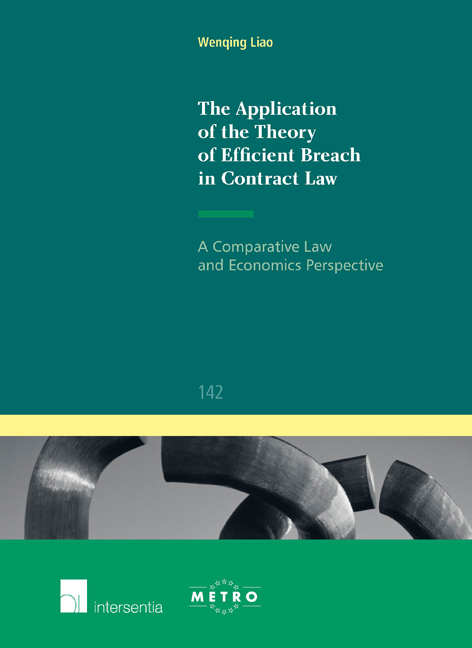 The Application of the Theory of Efficient Breach in Contract Law
The Application of the Theory of Efficient Breach in Contract Law Book contents
- Frontmatter
- Acknowledgements
- Contents
- List of Abbreviations
- List of Tables
- Chapter 1 Introduction
- Chapter 2 Economic Analysis of Contract and Contract Law
- Chapter 3 Efficient Breach in Law and Economics Theory
- Chapter 4 A Re-Examination of the Optimal Rule to Enhance Efficiency
- Chapter 5 Alternative Remedies and Efficient Breach
- Chapter 6 Efficient Breach and European Union Contract Law
- Chapter 7 Efficient Breach and Re-Negotiation in English Sales Law
- Chapter 8 Applying the Efficient Breach Doctrine to Chinese Commercial Sales Law
- Chapter 9 A Comparative Law and Economics Analysis of Efficient Breach in English Law, EU Law and Chinese Law
- Chapter 10 Concluding Remarks and Policy Recommendations
- References
- Table of legislation and European or international instruments
- Cases
- Valorization Addendum
- Ius Commune Europaeum
Chapter 4 - A Re-Examination of the Optimal Rule to Enhance Efficiency
Published online by Cambridge University Press: 12 December 2017
- Frontmatter
- Acknowledgements
- Contents
- List of Abbreviations
- List of Tables
- Chapter 1 Introduction
- Chapter 2 Economic Analysis of Contract and Contract Law
- Chapter 3 Efficient Breach in Law and Economics Theory
- Chapter 4 A Re-Examination of the Optimal Rule to Enhance Efficiency
- Chapter 5 Alternative Remedies and Efficient Breach
- Chapter 6 Efficient Breach and European Union Contract Law
- Chapter 7 Efficient Breach and Re-Negotiation in English Sales Law
- Chapter 8 Applying the Efficient Breach Doctrine to Chinese Commercial Sales Law
- Chapter 9 A Comparative Law and Economics Analysis of Efficient Breach in English Law, EU Law and Chinese Law
- Chapter 10 Concluding Remarks and Policy Recommendations
- References
- Table of legislation and European or international instruments
- Cases
- Valorization Addendum
- Ius Commune Europaeum
Summary
Applying the standard of efficiency, law and economics scholars have defined the concept of efficient breach as a situation where breach is more efficient than performance. In this situation, breach of contract, compared to performance, will make the promisor better off without making the promisee worse off. Hence, performing the original contract is undesirable for the promisor. Conversely, it is more efficient for the promisor to seek a release from the original contract so as to save the cost of performance (unfortunate contingency) or to implement another more profitable contract (fortunate contingency). In order to achieve that, the promisor may breach the contract by breaking his promise, or he may start to re-negotiate with the other party and modify the original contract.
Accordingly, it is assumed that the contract remedy rules should encourage breach when breach is efficient and discourage it otherwise. Based on this standard, some law and economics scholars have reached a consensus about the form of remedy that is most likely to promote efficient breach. They observed that expectation damages which put the non-breaching party in a position as if breach had not occurred will best motivate the promisor to take efficient breach. There is also literature clarifying the interactive relationship between the remedy of expectation damages and efficient breach.
The efficient breach doctrine, in its simplest form, stops here. However, on this basis it is still difficult to draw a conclusion about the relationship between contract remedies, efficient breach and efficiency. On the one hand, we need more empirical evidence to show that people indeed take more efficient breach and avoid inefficient breach under a particular type of contract remedy. On the other hand, it is unclear whether or not the remedy system which can best promote efficient breach will in fact contribute to welfare-enhancement. Moreover, criticism also comes from subjectivists and moralists. Whether or not efficiency should be the sole criterion for contract remedies is still being debated in the literature. The goal of this chapter is to examine how the doctrine of efficient breach is incorporated into legal rules and what is the limit of the integration.
- Type
- Chapter
- Information
- The Application of the Theory of Efficient Breach in Contract LawA Comparative Law and Economics Perspective, pp. 63 - 88Publisher: IntersentiaPrint publication year: 2015


